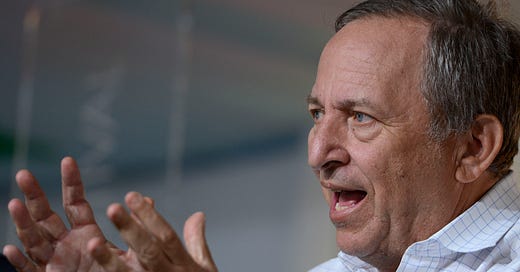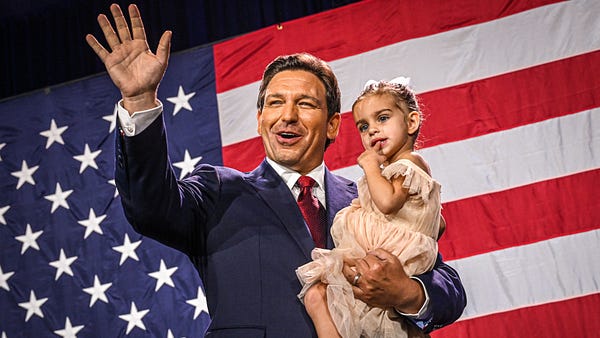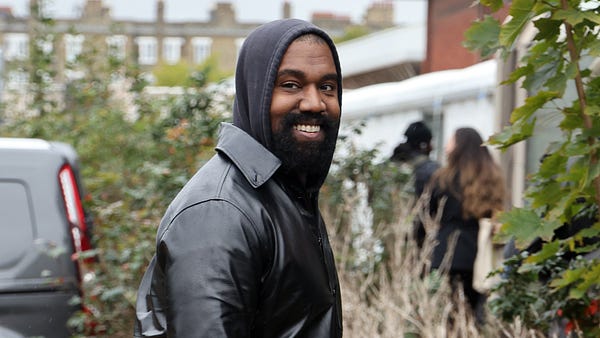
The Free Press

Larry Summers is one of the most important economists in the world. He’s been the chief economist at the World Bank. He was Treasury Secretary under President Clinton. He was director of the National Economic Council under Obama. And from 2001 to 2006, he was president of Harvard.
But perhaps more than anything on his resume, Summers is most well-known for his willingness to speak his mind—even if it means being the skunk at the garden party.
That’s exactly what he’s been for the past few years, as he’s warned about inflation and criticized the Biden administration’s spending policies. So why has the Biden administration invited the skunk inside?
Summers, it turns out, has been a key force behind the scenes on the Inflation Reduction Act—the massive climate, health, and tax bill signed into law by President Biden this week. He also reportedly worked to get Joe Manchin—who earlier this summer said he would not vote for the bill—to reverse course. (Read more about that here.)
Today, on Honestly, I spoke to Larry Summers. We talked about the state of the economy and whether or not the new law will actually reduce inflation. He also sounds off on the future of higher education and what he calls “the new McCarthyism.”
Listen here:
Or, if you prefer, read an edited transcript below. — BW
On predicting inflation:
BW: In 2021, you were trying to warn everyone about the threat of inflation. The New York Times columnist Paul Krugman said you were wrong. Treasury Secretary Janet Yellen said you were wrong. Jared Bernstein, chief economist during the Obama administration, said you were wrong “in a pretty profound way.” Now it’s August 2022, and we know they were wrong. And you were right. What did you see that they did not?
LS: The secret sauce of economics is arithmetic. After I did the arithmetic, it looked to me like the amount of water we were putting in the bathtub was far bigger than the capacity of the bathtub. But I didn’t know exactly what the capacity of the bathtub would be. I thought there might be various kinds of bottlenecks. But even if all that went well, I thought we were overstimulating the economy. So I forecasted that we’d have excessive inflation.
BW: If it was really a matter of straightforward quantitative analysis, arithmetic, and historical knowledge, why did people like Janet Yellen say you were wrong?
LS: I was surprised that there weren’t more people in agreement with me. Olivier Blanchard, the former chief economist of the IMF, was saying similar things. Jason Furman, the former director of the National Economic Council, was basically saying similar things as me. But most others were not. It’s tempting to blame it on politics, but I don't think there’s heavy political motivation among the prominent business economics forecasters at the major financial firms. They mostly just didn’t share my view.
So I wouldn’t emphasize politics, but short memories.
It had been 40 years since we’d had inflation. Most people’s lived experiences didn't include a major acceleration in inflation. I would also put some emphasis on bad statistical modeling. I think there was a factor of motivated belief. People wanted to avoid the mistakes of the slow recovery after 2010. They wanted to believe that they could engage in substantial expansionary policies.
I think there also may have been some belief that the Fed knows best. Some people in the financial community, particularly economists, may be reluctant to challenge the views of the Fed. I've always been a huge admirer of John Maynard Keynes. One of the things he famously said was that he changed his mind when the facts changed. I think a lot of people probably aren’t willing to adjust their views in the face of new evidence.
On working with a White House he criticizes:
BW: You’ve been one of the harshest critics of the Biden administration’s spending. A year ago, you were the skunk at the garden party. Yet you’re the person that the administration has quietly relied on to help sort out complicated aspects of the new Inflation Reduction Act. What’s it like working with an administration that you’ve been extremely critical of?
LS: With the exception of President Trump, I have almost never questioned anybody’s motives. I’ve never suggested that they were not being sincere or impugned anybody’s integrity. My approach has always been to focus on what the ideas are. That’s in part because I don’t feel that any of us should take positions of moral superiority, except in very extreme cases. It’s also in part because people hear you much better if you respect their sincerity.
I've also been careful in commenting on decisions public officials take because I recognize that those who are on the inside have knowledge that those of us on the outside do not have. I remember that well from when I was at the Treasury or in the White House. I had friends who would write things that were very critical of what we were doing, and I would think to myself: If they knew what I knew, they would not have taken that view.
I also do not share with the world when somebody calls me up for my advice. I do not share if they said something I considered wrongheaded. I think an approach of respectfulness, of confidentiality, and of focusing on substance makes it easier to maintain an open dialogue.
BW: Speaking of advice: let’s talk about your relationship with Joe Manchin of West Virginia. Manchin went from opposing a plan that was going to spend trillions of dollars to taking a leading role in the Inflation Reduction Act. Politico reported that you were instrumental in that change, that you called Senator Manchin personally to convince him to vote for the bill. Can you take us behind the scenes a little bit and tell us how that happened? How did you sell him?
LS: No, I can’t, Bari. I mean, I could, but I won't.
BW: Because?
LS: Because of the principle that I just described, which is if Senator Manchin wants to talk about his thinking, he’ll talk about his thinking in the way he wants to.
BW: A recent Wharton study said that the impact of the Inflation Reduction Act on inflation is “statistically indistinguishable from zero.” So, are you happy with the bill? Will it actually reduce inflation?
LS: I am happy with it. I don’t think its principal effect is going to be reducing inflation. But I do think it is going to serve some vital national interests in terms of protecting the environment, expanding health care, and making our tax system work better. Through that process, it is going to reduce inflation.
I think the Wharton study you quoted substantially underestimates the revenue gains from increased tax enforcement in the bill. It also doesn’t take any account of the non-macroeconomic factors—the superior purchasing of prescription drugs and the increased availability of low-cost energy. Anybody making an overall policy judgment should include those factors.
I do believe that the bill falls short in some important respects. It’s hugely unfortunate that it doesn’t go after the carried interest loophole, which both sides recognize as outrageous.
On the future of work, the future of the Fed and why people have lost trust:
BW: Talk to me about the future of work. If people need to work in order to have meaning in their lives, does that mean you’re against a policy like Universal Basic Income?
LS: We have a large number of people who are estranged from our economy. In 1960, 5% of men were not working between the ages of 25 and 54. Today it’s more like 15%. If 15% of men are not working at any point in time, then a quarter of the people will have been out of work for a year or more over a four or five-year period. That’s destructive to the economy's productive potential. It’s destructive to their families. It’s destructive to the areas in which they live. It’s destructive to the moral fabric of our national life.
I’m very skeptical about UBI. I worry that it would crowd out other social legislation by being either trivial in magnitude or prohibitive in expense. I worry about UBI increasing the deep social cleavages in our economy between the elite that generates spectacular wealth and everyone else. I’m skeptical of UBI not because I don’t care, but actually because I do, and I want to give people and their children a policy framework that makes for the most meaningful lives possible.
BW: President Biden and the White House have been assiduously avoiding the word “recession.” Wikipedia is preventing people from editing the recession page. Despite the economy facing two consecutive quarters of negative growth and inflation at its fastest pace in 40 years, many are denying it’s a recession. So what is your definition of a recession, and why won’t the current administration use the word?
LS: I’ll let the administration speak for itself on its language choices. A recession is a broad-gauged decline in economic activity. I don’t think we have seen that yet. I expect that sometime in the next two years, we will because of the magnitude of the inflation we've built up. But no one can be certain.
BW Do you think that institutions like the Fed are well prepared to navigate all of the crises we’re facing economically in the modern era? Or do we need a new set of institutions and systems to regulate monetary policy?
LS: I think the Fed has made a number of flawed judgments, particularly during 2021. Those bad judgments have reduced their credibility, which has made it harder to do what is necessary. When you are less trusted, it is harder to lead. I think those are the challenges we face, but I don’t think they call for some redesign of the Federal Reserve as a system. I think they call for making better, more careful judgments in the future.
BW: What do you say to the person that says: Why should I trust these people? Why should I trust these policymakers? Over the past few years, they said there was no inflation. Then when it became unignorable, they said it was transitory. But it wasn't. Then they said the problem was primarily with supply chains, and it wasn't. Then they blamed it on Putin. And this isn’t just about the Fed. This could be about lots of institutions in American life that have a very bad track record of getting things right. So why should we continue to trust them?
LS: Ronald Reagan had a very good phrase: “Trust, but verify.” I don’t think people should extend their unquestioning trust to any institution. People should watch carefully. They should listen to a wide range of voices and see what makes sense to them. We should be venerating rational and serious debate as a central value in our politics. I think that any institution needs to consider the extent to which it is trusted and how it can raise its trustworthiness.
For the Fed to issue a forecast every eight or sixteen weeks of what it thinks is going to happen to inflation and unemployment is to invite a loss of credibility. Inevitably, those forecasts are not going to be completely accurate.
Alan Greenspan and Paul Volcker understood what the Delphi Oracles understood, which is that if people think you're potent and infallible, but actually you're human, it's a good idea to keep your prophecies vague and oracular rather than to put your credibility at risk and shatter the illusion. I think the current generation of central bankers has gravitated to overly technocratic, mechanistic, and academic approaches that make the loss of credibility all but inevitable.
On the new McCarthyism and the future of higher education:
BW: You and I both know that the list of unsayable things and verboten subjects has grown unbelievably long since you gave a speech in 2005 about the lack of gender diversity in STEM that caused a lot of controversy. Now, even basic ideas like human biology or the idea that merit is a good thing are considered circumspect. What do you think of the war on merit?
LS: I think it’s a profound problem that it’s much more difficult on university campuses to venerate excellence, to celebrate accomplishment, to assert that there are greater and lesser truths, and to welcome iconoclasm. This is not a new phenomenon. In the 1950s, McCarthyism ran rampant. Those who had had past Communist affiliations, even if what they were doing was teaching chemistry, came into question. There were serious efforts by alumni to cancel the teaching of Keynesian economics because it was seen as subversive to the American way. All of that was terrible. It was the original McCarthyism.
The new McCarthyism around a different set of subjects is no less troubling, and it is a profound threat to American universities. When something profoundly threatens American universities, it, in turn, threatens the formative experiences of the people who will be leading our country a generation from now. It threatens the ability to develop the new ideas and conceptions that ultimately shape society, whether those are new cures for cancer or new understandings of human relations that led gay marriage to be widely accepted—something that would have been inconceivable a generation ago. It’s very dangerous for universities to become epistemically closed communities dedicated to social comfort. I worry about that every day.
BW: If you were president of Harvard right now, what would you do to ensure that an environment of free thought and speech is protected?
LS: I would very visibly try to invite speakers from a range of areas who challenge our local orthodoxies and make clear that I want to hear what they have to say. Not because, in most cases, I agree with them, but because I would think and speak more clearly for having considered their arguments.
BW So, would you invite Ron DeSantis to campus?
LS: Absolutely.
When I was president, I accepted every invitation I received to speak to the Federalist Society, not because I agreed with what the Federalist Society said on many issues, but because I thought it was important that those views be considered on our campus. I would try to provide support, as I did in many quiet ways during my time as president, for students who somehow felt beleaguered or challenged.
And when there was a call to divest Israel from our endowment, I did not simply say what was said on many other campuses, which was that divestiture is a problematic tool for achieving political purposes. I labeled the call antisemitic in effect, if not in intent. I felt that if Harvard actually did divest and did it uniquely to Israel, the signal would be antisemitic.
Lightning round:
BW: What historical event has had the greatest influence on your economic views?
LS: The Depression.
BW: Among the economists you disagree with, who do you respect the most?
LS: Milton Friedman.
BW: Are Asians in the Ivy League the new Jews?
LS: In some ways.
BW: Do you support affirmative action?
LS: Yes.
BW: If you could have dinner with any historical figure, who would it be?
LS: John Maynard Keynes.
BW: What’s the best career advice you’ve ever received?
LS: Don’t be fungible. Follow your passion. Do something unique.
BW: If you could keep one book with you for the rest of your life, what book would it be?
LS: The General Theory.
BW Bibi Netanyahu offered you the chance to run the Central Bank of Israel. Why did you say no?
LS: Many reasons, including the fact that you have to speak your country's language to be able to run a central bank, and I don't speak a word of Hebrew.
BW: What will China be like in ten years?
LS: It will be much less economically threatening to the United States than it is today. But that may make it no less geopolitically threatening.
BW: Will globalization be remembered historically as a net positive or a net negative?
LS: Immense net positive.
BW: The Social Network. Good or bad movie?
LS: Excellent movie.
BW: What do you think Joe Biden’s legacy will be?
LS: He got America to move way back towards getting on track after a deeply dangerous and crazy period.
BW: In a year from now, what do you think the most urgent thing on our minds will be? What would we need to talk about a year from now?
LS: Making sure that populism does not completely pollute American politics to the point of producing dangerous outcomes in 2024.













Hey if I predict that some people down the street are going to get run over by a car and then get in my car and run over some people down the street does that make a prophetic traffic expert?
Larry Summers is an absolutely ghoulish figure. The entirely of his life's work can be best defined as economic crimes against humanity in the form of deliberately immiseration and deprivation of workers and the poor for the purpose of increasing profits for a handful of amoral sociopaths.